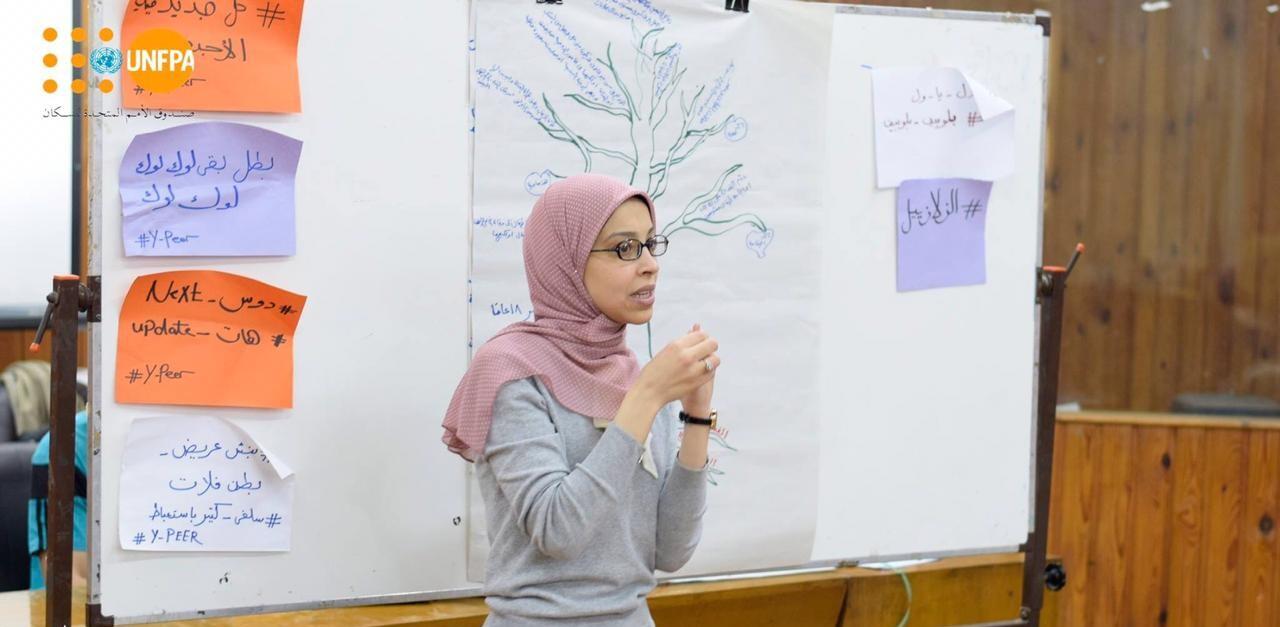If you were to ask Aya Seyam about issues related to sexual and reproductive health five years ago, she would become visibly uncomfortable and could even break into tears.
Today, she says advocating against harmful practices such as FGM and early marriage has become her passion.
At the age of 20, Aya signed up to become a trainer with Y-PEER, UNFPA’s youth leadership network. The first session, she was tasked to discuss the anatomy. “I cried, these things for me were wrong and shameful.”
Aya was anxious about being asked questions she would be too embarrassed to answer.
“Now I raise questions myself and then answer them,” she says.
The 25-year-old has had a diligent journey promoting women’s rights and advocating against harmful practices. She went from being a Y-PEER trainer specialized in gender-based violence, to becoming a coordinator in her governorate of Damietta, to eventually becoming a case manager at Sanad, one of UNFPA’s safe spaces, providing protection and empowerment for women and girls affected by humanitarian crises.
Y-PEER works to strengthen and spread high quality peer-to-peer education in the field of sexual and reproductive health.
It is when she started going around villages giving sessions about the harms of FGM as part of Y-PEER, that she realized the potential impact of her work and became comfortable with her message.
“I realized there are organs in my own body whose function I did not know,” she says. After learning more and more about these topics, she says she realized her role in making an impact.
“During one my first sessions, one woman walked up to me and told me 'if you say FGM is harmful, I will not subject my daughter to it' … so I paused and thought about how important what I’m going to say is,” Aya says.
She also recalls a father who approached her following a session where she spoke about early marriage, and told her he would never put his daughter through it.
“I started really believing in these issues,” she says, “and you have to believe in them in order to relay the message properly.”
Aya saw herself as a vessel, conveying facts about these issues, leaving it up to the listener to make their own choices.
Now as a case manager in the Safe Space in Damietta, Aya believes she is on the other side. “I used to relay messages, now it is my job to listen.”
UNFPA’s Safe Spaces offer a chance for women and girls affected by humanitarian crises to socialize and re-build their social networks, receive social support, acquire relevant skills, access gender-based violence response services (psychosocial, legal, medical and receive information on issues relating to women’s rights, health, and services.
Aya finds her work there especially different because she deals mostly with survivors of gender-based violence.
“I become mainly eyes, ears and a heart,” she explains, “with my eyes I am showing you that I am with you, eyes are the best means of communication, with my ears I listen to you and with my heart I make you feel that this is a safe space for you to talk.”
In her capacity as a case manager, Aya’s role is five-tiered. She identifies who might have been subjected to gender-based violence, diagnoses the form of violence, tailors an intervention plan, implements it and follows up on the case.
The intervention plan may include referrals to other services such as health or legal, when requested by survivor, provide counseling services, and/or support for financial independence through vocational training, among other things.
“I don’t like to use the term ‘case manager,’ I call it ‘venting specialist’,” she laughs, “I don’t want it to be too formal and drive people away, I want to be relatable.”
Although Aya is only in her third month as a “venting specialist,” she says she has made strides in getting women to open up to her.
The first time she spent time with women and girls at the safe space was when joined them for a Ramadan Iftar. Aya tackled issues relating to protecting their own bodies and says that by the third month they were comfortable enough to approach her with their problems.
For Aya to identify a case, she has to be observant. “When I raise a certain issue and I see engagement from certain participants, it is likely that they are being subjected to it,” she explains.
She recalls a survivor of gender-based violence who approached her and told her that she realized she should stand against it only when she heard Aya speak about it.
“It is important to understand who you are, what you’re doing and how you’re going to affect people,” she says.
Now, Aya is more comfortable in her role as ever.
“I remind myself that I am reaching people through the Safe Spaces I would’ve otherwise never met in my life,” she says.


